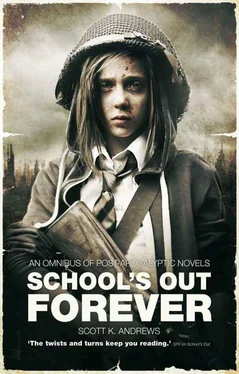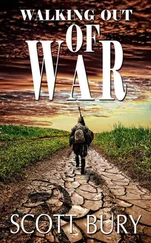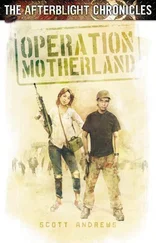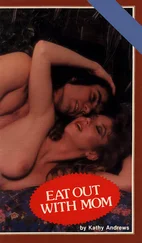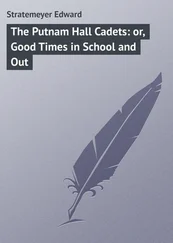Scott K. Andrews
SCHOOL’S OUT
FOREVER
An Omnibus of Post-Apocalyptic Novels

INTRODUCTION
I’D LIKE TO start by apologising.
See, I love these books. Frickin’ love ’em. Obviously, we love all our books equally, here at Abaddon Towers, and I know you’re not supposed to have favourites, but of all the favourites I don’t have, these are among my most illicitly favouritey.
Scott K. Andrews was a happy discovery. When you’re starting a new imprint, inevitably you tap into your networks: you talk to agents, approach authors you already know, tap (in our case) into the talent pool already working for our sister imprint, 2000 AD ; try and get some strong titles out there right away. But having sorted out our first couple of commissions, we floated the world bibles for most of our settings out there for people to submit to. Just to see who’d bite.
Scott bit. He gave us a couple of concepts, and his Afterblight Chronicles pitch, School’s Out (which you can see at the back of the book, in the bonus material section), grabbed us. And a future Kitschie nominee was born.
Which makes it sound like he came out of nowhere, but Scott’s prouder than anyone I know that he’s paid his dues and shown his commitment. If there was work, he’s taken it, and given it his all. This is the man who wrote The Unofficial Guide to Dawson’s Creek, and he’s pretty damned proud of that, too.
So why am I apologising?
Scott’s an amazing writer, and he captured the feel of Abaddon right away. We need fast-moving and high-action, and he delivered that in spades. We need dark and gritty, and he was all over it. And most of all, we needed really engaging characters. These books weren’t going to be long, and the pace was going to be relentless; the reader would have to connect with the heroes quickly.
And you will connect with these characters. Shit, you’ll love them. They’ll get under your skin, and you’ll stand with them every step of the way. When they make questionable decisions, you’ll understand, and when they triumph, you’ll glory in it.
And you know what? Some of them are going to die.
Not just the bad guys; not just the compromised ones, or the ones that deserve it. Hell, some of the characters who deserve death aren’t going anywhere. But some of the guys you love the most, who you’ll start mentally planning happy-ever-afters for long before the end of the trilogy, will buy it, messily and alone, and for the cruellest and most arbitrary of reasons. And you’ll be totally blind-sided.
So, yeah. Sorry.
There’s more than a little of Golding’s Lord of the Flies , here, but it’s a grimier, prouder kind of story. I was always bothered by the way the adults represented such perfect civilisation and restraint in Golding’s classic. The adults had to leave the narrative altogether before the kids could really go off the rails; and when the landing party arrives at the end, there’s a sense that it’s all over now, and the wrongs will be righted.
But Andrews’ adults lose their shit roughly five minutes before the kids, when The Cull hits, and it’s up to the kids to take care of things for themselves. And when, as the story unfolds and St Mark’s School for Boys and Girls becomes something real, a symbol for hope, and sympathetic adults start crossing over from the rest of the Afterblight world and try and step in, they get short shrift:
“Don’t you fucking dare, Mr High-And-Mighty-Grown-Up-Man, tell me that children have no place in the front line. Because it’s you lot who’ve bloody put us there. And believe me: every adult we meet is going to regret standing by and letting that happen.”
It’s a big “fuck-you” to authority, a statement of intent from a band of young men and women who have lost every guardian, guideline and moral compass their old lives offered and had to build up from scratch, and I promise you you’ll be proud of them.
So again: sorry about what’s coming.
David Moore (Editor) May 2012

Original cover art by Mark Harrison

LESSON ONE
HOW TO BE A KILLER

CHAPTER ONE
I CELEBRATED MY fifteenth birthday by burying my headmaster and emptying my bladder on the freshly turned earth. Best present a boy could have.
I found his corpse on the sofa in the living room of his private quarters. I’d only been in that room once before, when I was among a group of boarders who pretended to play chess on his dining table while he stood behind us beaming benevolently as part of a photo shoot for the school prospectus.
He didn’t look so smug now, curled up under a blanket clutching a whisky bottle and a handful of pills. I reckoned he’d been dead for about two weeks; I had become very familiar with the processes of bodily decay in the preceding months.
I opened a window to let out the stink, sat in the armchair opposite and considered the fate of a man I had hated more than I can easily express. At moments like this the novels I had read always portrayed the hero realising that their hatred had vanished and been replaced by pity and sadness at the futility of it all. Bollocks. I still hated him as much as ever, the only thing missing was the fear.
The corridor that ran alongside the head’s living room was walled by a thin wooden partition and the dormitory I used to share with three other boys lay on the other side. At night the four of us would lie awake and listen to our headmaster drunkenly arguing with his wife, our matron. We liked her. She was kind.
He had been no nicer to the boys in his care. His mood swings were sudden and unpredictable, his punishments cruel and extreme. I don’t mean to make St Mark’s sound like something out of Dickens. But our headmaster was a bully, pure and simple. Far worse than any of the prefects he’d appointed, with the possible exception of MacKillick; but he was long gone, thank God.
I was glad the head was dead, even gladder that his death had come at his own hands. I enjoyed imagining his despair. It felt good.
Perhaps I should have worried about my mental state.
I considered pissing on the corpse there and then, but decided it would be crass. Pissing on his grave seemed classier. I was just about to get on with the grisly task of hauling him downstairs when I heard a low growl from the doorway to my right.
Shit. I’d forgotten the dog.
Nasty great brute called Jonah. An Irish wolfhound the size of a pony that liked to shag our legs when Master wasn’t around to kick some obedience into it. Always had a hungry look in its eyes, even back then. I didn’t want to turn my head and see how it looked after two weeks locked in a flat with a decaying owner.
Two things occurred to me: first, that the dog’s fear of its master must have been intense to prevent it from snacking on the corpse, and second, that by the time I was able to rise from my seat it’d be upon me and that would be that.
The headmaster’s wife left him in the end. One Saturday morning while he was out taking rugby practice she rounded up all the boys who weren’t on the team and together we helped move her stuff out of the flat into the transit van she had waiting downstairs. She’d kissed us all on the cheek and driven off crying. When he returned and found her gone he seemed bewildered, asked us if we’d seen her go. We all said “no, sir.”
Читать дальше
